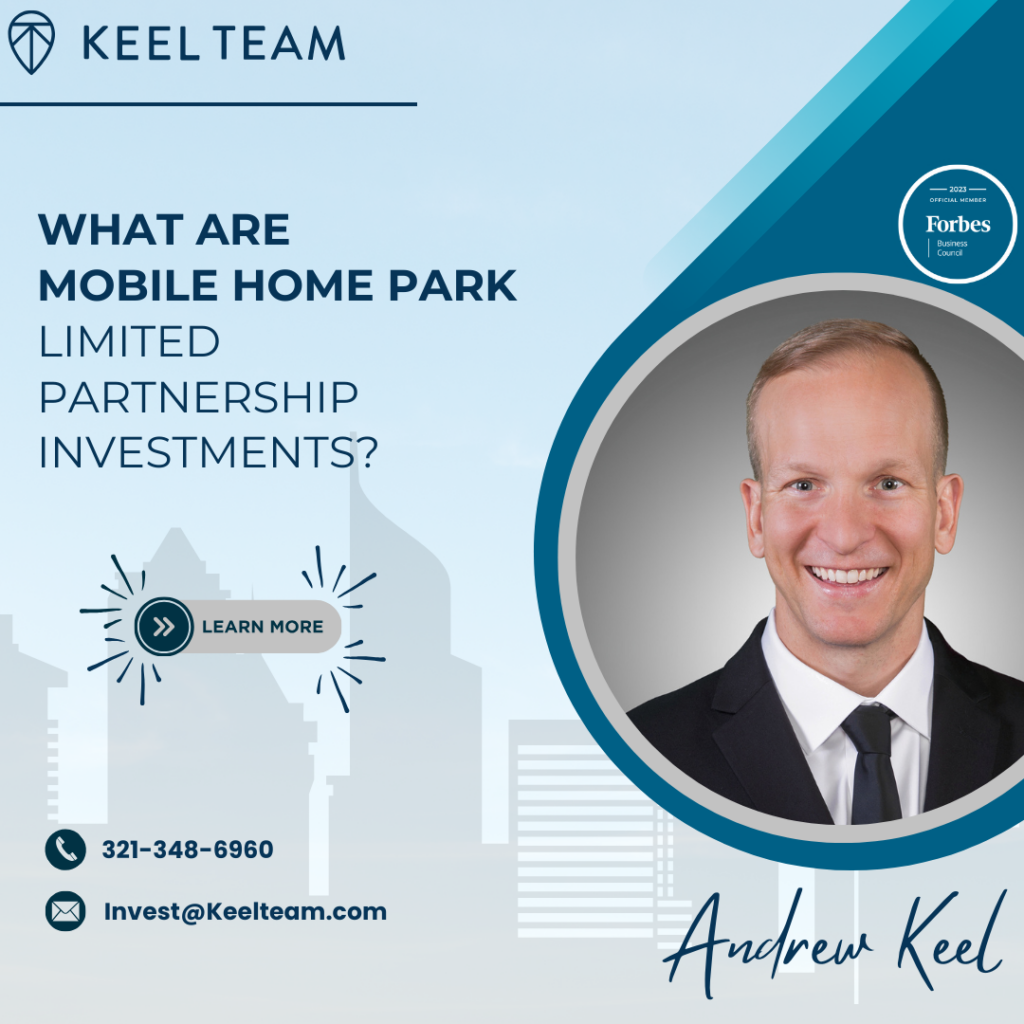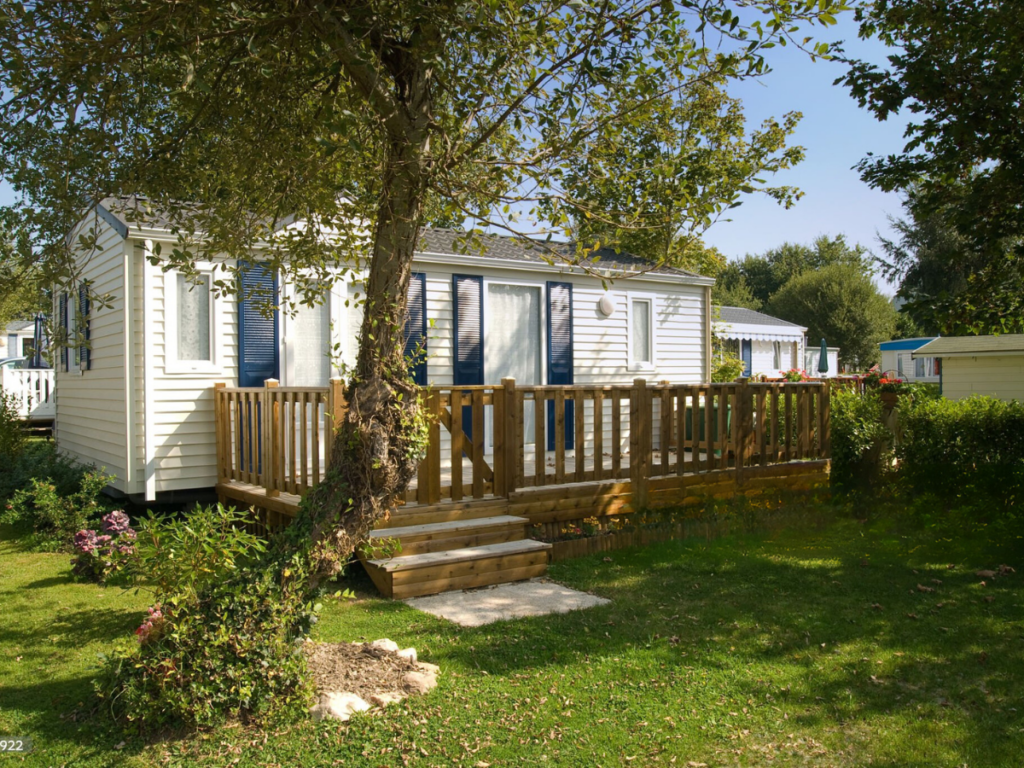What Are Mobile Home Park Limited Partnership Investments?
-
 Andrew Keel
Andrew Keel

Introduction
Investing in mobile home park limited partnerships has gained significant attention as an alternative avenue for individuals seeking to diversify their portfolios and generate passive income. Limited partnership investments in mobile home parks involve pooling resources with other investors to collectively own and manage a mobile home community. This investment model offers unique advantages compared to typical stock and mutual fund investments, attracting those looking for a more hands-on approach to real estate without the responsibilities of direct management.
What are Mobile Home Park Limited Partnership Investments?
In mobile home park limited partnership investments, investors assume the role of limited partners (LP), contributing capital to fund the acquisition and operation of a mobile home park. The limited partners enjoy a hands-off approach to management, with the responsibility falling on the general partner (GP) or syndicator. These partnerships typically aim to generate passive income through the steady stream of lot rents paid by residents leasing space within the mobile home park.
Who Should Consider Mobile Home Park Limited Partnership Investments?
Real Estate Enthusiasts:
- Individuals passionate about real estate but hesitant to undertake the challenges of sole ownership or management may find limited partnerships in mobile home parks appealing. It offers exposure to the real estate market without the hands-on responsibilities.
Passive Income Seekers:
- Investors looking for reliable and consistent passive income can potentially benefit from mobile home park limited partnerships. The stable revenue generated from lot rents can potentially provide a steady income stream without the volatility often associated with stocks or mutual fund investments.
Diversification Seekers:
- Those seeking to diversify their investment portfolio beyond traditional stocks and mutual funds may find the unique characteristics of mobile home park investments attractive. Real estate, particularly in the affordable housing sector, offers diversification potential.
Hands-Off Investors:
- Limited partners who prefer a more passive role in their investments are well-suited for mobile home park limited partnerships. The general partner handles day-to-day operations, leaving limited partners free from the obligations of active management.
Download my free eBook on the “Top 10 Things to Review When Considering a Passive Mobile Home Park Investment “

Advantages Compared to Stock and Mutual Fund Investments:
Stable Income Stream:
- Mobile home park limited partnerships can potentially provide a reliable income stream through monthly lot rents. Unlike stocks, which may not offer regular dividends, investors in these partnerships often enjoy consistent distributions.
Tangible Asset Ownership:
- Limited partners in mobile home park investments gain partial ownership of tangible assets – the mobile home park itself. This contrasts with stocks, where ownership is often intangible and disconnected from physical assets.
Lower Market Volatility:
- Real estate investments, especially in essential sectors like affordable housing, are generally less susceptible to market volatility than stocks. Mobile home park limited partnerships offer a degree of stability in uncertain economic conditions.
Diversification in Real Estate:
- While mutual funds may offer diversification, real estate investments through limited partnerships provide a unique form of diversification within the broader real estate market. Mobile home parks present an often overlooked niche that can contribute to a well-rounded portfolio.

How to Get Started with Mobile Home Park Limited Partnership Investments:
Educate Yourself:
- Begin by learning about real estate syndication and specifically passive mobile home park investments. Resources such as books, online courses, podcasts and industry publications can provide valuable insights.
Network with Syndicators:
- Connect with experienced syndicators or general partners in the mobile home park sector. Attend real estate events, join online forums, and seek mentorship to gain a deeper understanding of the industry.
Evaluate Opportunities:
- Assess potential mobile home park limited partnership opportunities. Consider factors such as location, historical performance, and the track record of the general partner. Due diligence is crucial before committing capital.
Secure the Minimum Investment Required:
- Determine the capital required for your investment and secure the necessary funds. Mobile home park limited partnerships may have varying entry points, so be prepared to meet the financial commitments.
Review Legal Documents:
- Thoroughly review all legal documents associated with the limited partnership, including the private placement memorandum (PPM) and the operating agreement. Seek legal advice if needed to ensure a comprehensive understanding.
Conclusion:
Investing in mobile home park limited partnerships offers a unique blend of passive income, real estate ownership, and portfolio diversification. As with any investment, careful consideration, education, and due diligence are crucial for success. For those seeking an alternative to traditional stock and mutual fund investments, mobile home park limited partnerships present an intriguing opportunity in the ever-evolving landscape of real estate syndication.
Contact us below if you’re curious about real estate syndications and our approach to investing in undermanaged, value-add mobile home parks in the Midwest. To learn more, check out The Passive Mobile Home Park Investing Podcast with Andrew Keel
Learn more about mobile home park investing.
Interested in learning more about mobile home park investing? Get in touch with us today to find out more.
Disclaimer:
The information provided is for informational purposes only and should not be considered investment advice, nor a guarantee of any kind. There are no guarantees of profitability, and all investment decisions should be made based on individual research and consultation with registered financial and legal professionals. We are not registered financial or legal professionals and do not provide personalized investment recommendations
Andrew Keel
View The Previous or Next Post
Subscribe Below 👇





